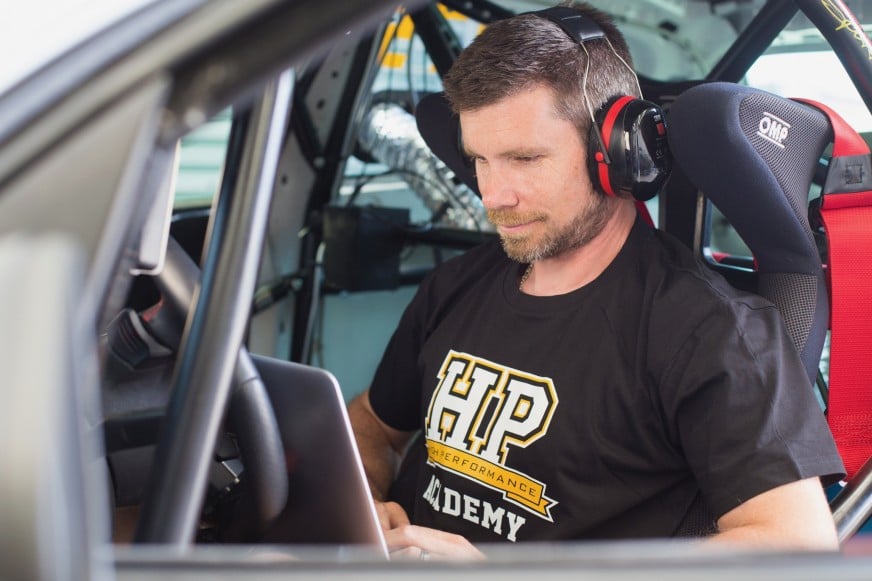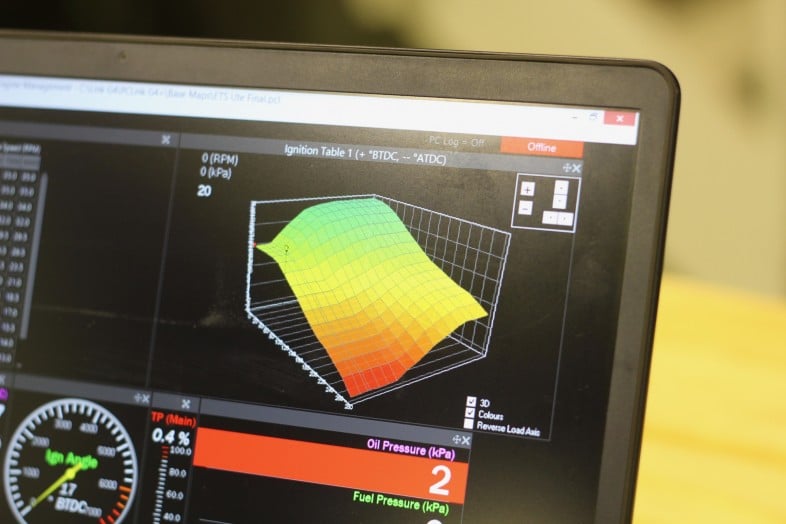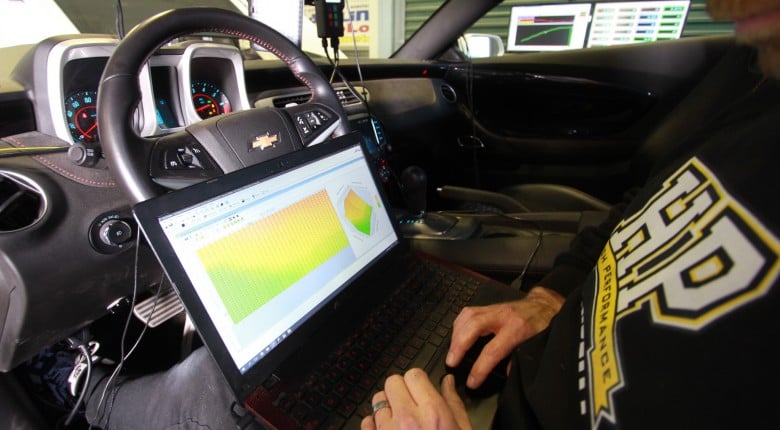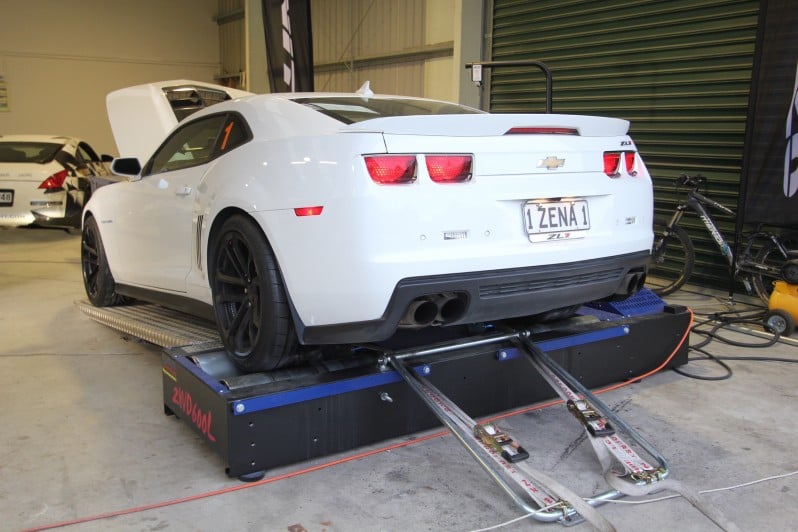Back in your grandparents' day “tuning your car” or getting a “tune up” was the equivalent to getting a service or changing your oil and spark plugs. Nowadays when someone mentions “tuning your car” or “getting a tune” they're more than likely talking about optimizing the fuel and ignition to allow your engine to make more power and therefore make your car go faster.
In this article, you'll learn what you need to know to tune a car.
Tuning a car is something that you (yes you) can do to a very high standard at home. As long as you're willing to invest some time, get the correct guidance, and purchase some modestly-priced tools.
If you're looking to take your car to a tuning shop to be tuned, you will still learn a lot in this article.

The Broad Strokes of Tuning a Car
- Get the tools
- Choose a software/hardware tuning product
- Understand the process
- Plug in your laptop
- Start tuning
- Enjoy a well-tuned car
Let’s address some basic questions first.
What is Tuning?
In its simplest form, tuning an engine is optimizing two things:
- How much fuel is injected into the cylinders
- The timing of when the spark plugs fire
When we're tuning a car, we're optimizing these two things to make the most torque possible from the engine. (Article about power and torque).

Why Tune a Car?
There are many reasons why you'd want to tune your car, but the main one is to make more power.
We are going to assume from here on out that you want to tune a car to improve its performance.
Why Isn’t My Car Tuned for Maximum Performance From the Factory?
If you have a stock standard car with no modifications, you'll be asking the question: “Why isn’t my car tuned correctly from the factory?”.
This is a really valid question, you paid good money for a car and expect it to be optimized right from the get-go.
However, the vehicle manufacturer's goals are normally much different to your own. Manufacturers aim to keep production costs low, provide different spec models, meet government emissions standards, and ensure that the vehicle is as reliable as possible even when the same car is sold all over the world and exposed to a wide range of climates and fuel qualities.
Another thing manufacturers do is run the same basic engine package in a variety of cars. For example, Mercedes Benz uses the same engine in a few of their cars, with the lower spec models making less power than the higher spec models with EXACTLY the same components. This means they can sell the high spec vehicles with more power for more money.
The good news though, is that your factory tune almost always has some power that can be “unlocked” by just optimizing the tune for your specific usage.
How Much Power Will I Make When Tuning My Car?
The real answer here is... “it depends”. And yes, we know that’s not a very satisfying answer.
It’s not uncommon to see horsepower gains of 5-10% or more with no hardware modifications.
We recommend doing a bit of research here. Search the following “Your make + model + tune only power gains” (Mitsubishi EVO 9 tune only power gains) and you should come across some forum posts, blog posts, articles, or YouTube videos that will give you some figures.
Take all of these with a little scepticism — some people/companies inflate their power figures or don’t disclose all their modifications.
In some cases, you'll find that there's absolutely no power hiding in a factory tune, which means you'll have to make some hardware changes (air intake, exhaust, etc) to get an increase in power.
General rules of thumb:
(Keeping in mind that there are always exceptions to the rules)
- Turbo cars often do really well from just a tune as you're able to increase the boost.
- Naturally aspirated cars (those without a turbo or supercharger) normally don’t respond as well to a tune only.
- Almost every performance car will see some increase in power from a tune.
Can You Tune a Car Yourself?
The short answer here is: YES.
Tuning your car is something that you (yes you) can do to a very high standard at home. As long as you're willing to invest some time, get the correct guidance, and purchase some modestly priced tools.
Tuning to Suit Your Modifications and Upgrades (the Exciting Bit)
So far we've spoken a lot about standard cars without modifications. Let’s now talk about tuning to suit aftermarket performance modifications.
The first and most important point to make here is when you're adding any parts to a car that change how much air is going into or leaving the engine, or you’re changing any aspect of the fuel system — you will need a tune.
In most cases, you'll need a tune to make sure that you're not going to blow up your engine, and to ensure you are getting the most power from the modifications.
Examples of mild upgrades could include a better flowing air intake, a bigger exhaust, or an aftermarket header.
More aggressive modifications could include a supercharger or turbocharger, high flowing cylinder head/s, or performance camshafts.
When you're tuning to suit modifications you've made, the power figures you can expect will vary greatly depending on the parts you've installed.
What Tools Will I Need to Tune a Car?
You will need some specialist tuning tools in order to tune a car. This list doesn't include the software you'll need — we'll talk about that soon.
Here is the quick list:
- Wideband AFR Meter
- Audio Knock Detection Equipment
- Laptop (you don’t need anything too special here)
As you've already learnt, EFI tuning is all about delivering the correct amount of fuel and igniting it at the correct point in the engine cycle.
To measure how much fuel we should be injecting into the engine, we need an Air Fuel Ratio Meter. This device has a sensor that is placed in the vehicle’s exhaust and displays either an air fuel ratio or a lambda number. Be careful not to confuse a wideband meter with a narrowband sensor, which is often fitted to vehicles from the factory.
These wideband sensors can be portable (moved from car to car) or installed permanently — either one will work when tuning your car.
Optimizing your engine's timing is often done using a dyno. These are expensive, big pieces of equipment used by professional tuners to measure how much torque a vehicle or engine is making. For this article, we're going to assume that you don’t have access to a dyno and will be tuning your car without one.
Even without a dyno, it’s possible to do a great job of tuning the ignition timing (when the spark plug fires), and for that you'll need an Audio Knock Detection system to monitor for knock. (Watch this video to hear what knock sounds like)
We believe knock is the number one killer of performance engines, so what is it? In a sentence, knock is when the fuel and air mixture is spontaneously combusted, which results in sharp pressure spikes inside the engine. The result of detonation/knock can be really destructive. You might have heard “knock” being referred to as “detonation” — this is the same thing.
Luckily as a tuner, we can listen to the engine using a Knock Monitor which is essentially a microphone and some digital processing that makes it easy to hear through headphones what’s happening inside the engine.
To learn more about knock, here's a in-depth article which explains it well.
The final piece of equipment you'll need is a laptop. Tuning your car doesn’t require anything too special — an entry-level laptop will do the job. It's important that you're able to connect to the laptop with USB (directly or with an adaptor) and it’s really helpful if the battery is in good condition.
Read this Essential Tuning Tools article that shows what tools you'll need in a bit more detail and also has recommendations for what to buy.
What Software or Hardware do I Need to Tune a Car?
To tune your own car, you'll need specialized software and/or hardware to control the engine.
There are two main options here: an aftermarket standalone engine management system, or a reflashing tool that enables you to tune the factory engine management system.
Which option is right for you will depend on if there's a suitable reflashing tool for your make and model of car, if the software will support the extent of your modifications, and what you're using the car for.
An aftermarket standalone engine management system is a complete physical replacement for your factory engine management system, they come in either plug-in or wire-in form, and come with their own tuning software. Common standalone engine management systems are made by companies like Haltech, MoTeC, Link, AEM Infinity (and literally hundreds more). These are most commonly used in dedicated race cars or cars where no reflashing solution exists.
A reflashing tool that tunes the factory engine management system is an interface that lets you plug in to the factory computer tin order to adjust the tune. A reflashing tool comes with its own software to allow you to make your tuning changes. Popular reflashing tools include HP Tuners, COBB, EFI Live, and ECUTEK. Read more about reflashing here in this What is Reflashing article.
For most popular performance cars produced after the year 2000, there's often a reflashing tool that will do the job well.
Where do I Learn the Tuning Process?
The next step to tuning your own car is actually getting behind the laptop and making some tuning changes.
To do this, you need two key pieces of information. First, you need a fundamental knowledge of how an engine works and what we're trying to achieve by tuning it. Secondly, you'll need a process to follow to ensure you don’t miss any important bits.
These are both available as online courses at the High Performance Academy — EFI Tuning Fundamentals and either Practical Standalone Tuning or Practical Reflash Tuning depending on which path you take.
If you're tuning your car yourself or you’re going to take your car to a tuner, you should watch our free lesson that shows the process. Claim your seat by clicking here.






